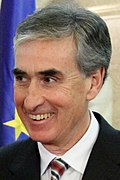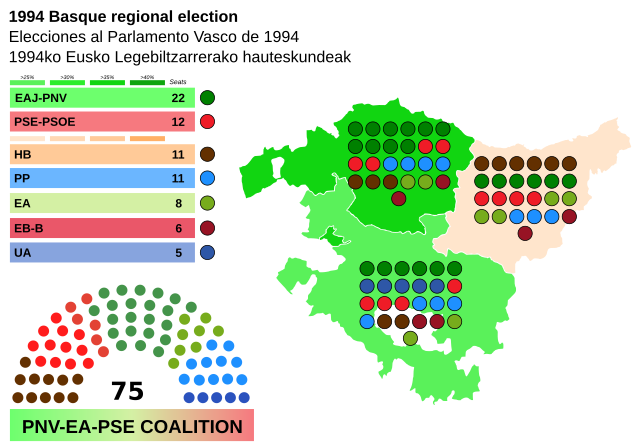Top Qs
Timeline
Chat
Perspective
1994 Basque regional election
Election in the Spanish region of the Basque Country From Wikipedia, the free encyclopedia
Remove ads
A regional election was held in the Basque Country on Sunday, 23 October 1994, to elect the 5th Parliament of the autonomous community. All 75 seats in the Parliament were up for election.
The Basque Nationalist Party (EAJ/PNV) won 22 seats, the Socialist Party of the Basque Country (PSE–PSOE) came second with 12 seats, People's Unity (HB) and the People's Party (PP) both won 11 seats each. Basque Solidarity (EA) won 8 seats.
This was also the first election to the Basque parliament that the Socialist Party and the Basque Country Left (EE) party contested together as a unified party.
Remove ads
Overview
Summarize
Perspective
Electoral system
The Basque Parliament was the devolved, unicameral legislature of the autonomous community of the Basque Country, having legislative power in regional matters as defined by the Spanish Constitution and the Basque Statute of Autonomy, as well as the ability to vote confidence in or withdraw it from a lehendakari.[1] Voting for the Parliament was on the basis of universal suffrage, which comprised all nationals over 18 years of age, registered in the Basque Country and in full enjoyment of their political rights.
The 75 members of the Basque Parliament were elected using the D'Hondt method and a closed list proportional representation, with an electoral threshold of five percent of valid votes—which included blank ballots—being applied in each constituency. Seats were allocated to constituencies, corresponding to the provinces of Álava, Biscay and Guipúzcoa, with each being allocated a fixed number of 25 seats in order to provide for an equal parliamentary representation of the three provinces, as required under the regional statute of autonomy.[1][2]
Election date
The term of the Basque Parliament expired four years after the date of its previous election, unless it was dissolved earlier. The election decree was required to be issued no later than the twenty-fifth day prior to the date of expiry of parliament and published on the following day in the Official Gazette of the Basque Country (BOPV), with election day taking place between the fifty-fourth and the sixtieth day from publication. The previous election was held on 28 October 1990, which meant that the legislature's term would have expired on 28 October 1994. The election decree was required to be published in the BOPV no later than 4 October 1994, with the election taking place up to the sixtieth day from publication, setting the latest possible election date for the Parliament on Saturday, 3 December 1994.[1][2]
The lehendakari had the prerogative to dissolve the Basque Parliament at any given time and call a snap election, provided that no motion of no confidence was in process. In the event of an investiture process failing to elect a lehendakari within a sixty-day period from the Parliament re-assembly, the Parliament was to be dissolved and a fresh election called.[3]
Remove ads
Parties and candidates
Summarize
Perspective
The electoral law allowed for parties and federations registered in the interior ministry, coalitions and groupings of electors to present lists of candidates. Parties and federations intending to form a coalition ahead of an election were required to inform the relevant Electoral Commission within ten days of the election call, whereas groupings of electors needed to secure the signature of at least one percent of the electorate in the constituencies for which they sought election, disallowing electors from signing for more than one list of candidates.[2][4]
Below is a list of the main parties and electoral alliances which contested the election:
Remove ads
Opinion polls
Summarize
Perspective
The table below lists voting intention estimates in reverse chronological order, showing the most recent first and using the dates when the survey fieldwork was done, as opposed to the date of publication. Where the fieldwork dates are unknown, the date of publication is given instead. The highest percentage figure in each polling survey is displayed with its background shaded in the leading party's colour. If a tie ensues, this is applied to the figures with the highest percentages. The "Lead" column on the right shows the percentage-point difference between the parties with the highest percentages in a poll. When available, seat projections determined by the polling organisations are displayed below (or in place of) the percentages in a smaller font; 38 seats were required for an absolute majority in the Basque Parliament.
Remove ads
Results
Overall
Distribution by constituency
Remove ads
Aftermath
Notes
- Within PSE–EE (PSOE).
References
Wikiwand - on
Seamless Wikipedia browsing. On steroids.
Remove ads















